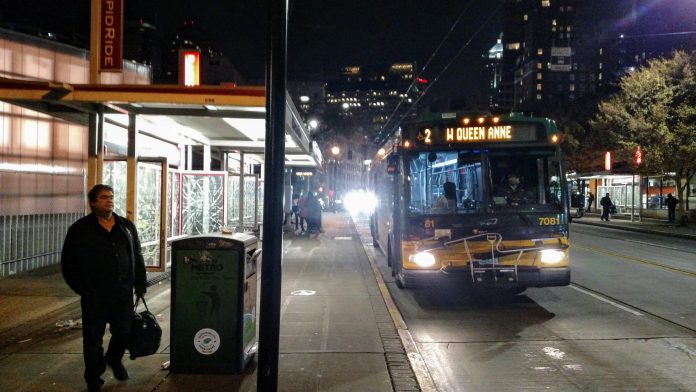King County Metro recently issued an online survey pertaining to potential changes to Night Owl Service. These changes would be a temporary response to Covid-19 and create a free reservation system for 1am to 5am service. The agency would provide interpreter and TTY (Deaf, hard of hearing, or speech-impaired) services.
Metro said the proposal is a response to feedback from riders, many of whom are essential workers, who were unable to board their desired bus due to physical distancing capacity limits. Operators are allowed to pass bus stops when they hit the limits, 12 passengers for a 40-foot bus and 18 for a 60-foot bus.
Missing a bus during a period of infrequent service is unacceptable for our region’s essential workers. King County Metro is trying to ensure enough space to support essential trips during their Night Owl Service. A reservation system could be a solution for King Count’s technology-abled essential workers.
While the suggestion has positive intentions, I am concerned by potential inequities of a reservation system. Access to a phone and phone service are likely requirements to access a reservation system. Those requirements may put Night Owl Service out of reach of our homeless people and other disadvantaged populations.
Information barriers may also disadvantage those communities. For one, they may not be aware of a potential change if it occurs. Signage may not be visible during Night Owl Service times, so anyone unaware of the change may miss critical bus service.
Additionally, if King County Metro is only using this online survey, I’m concerned they may get an unrepresentative sample of their ridership. Internet access is even more inaccessible than phone service.
Overall, this is a case of public health policy getting in the way of our transit-inclined essential workers. I’m nervous about potential changes that may end up further disadvantaged underprivileged peoples during a public health crisis. King County Metro is trying to balance reduced schedules with the demand for its service.
Where can homeless people safely shelter if not the bus given overcrowding at overnight shelters and years of inadequate response to the homelessness crisis–not to mention victim-blaming. It’s far from an ideal situation, but until the regional authorities offer a viable alternative to serve homeless folks, what other recourse do we have?
If you plan on filling out the survey to voice your concerns, keep our less well-off neighbors in mind as well. The survey will be open for comment through May 31, 2020.
Shaun Kuo is a junior editor at The Urbanist and a recent graduate from the UW Tacoma Master of Arts in Community Planning. He is a urban planner at the Puget Sound Regional Council and a Seattle native that has lived in Wallingford, Northgate, and Lake Forest Park. He enjoys exploring the city by bus and foot.


